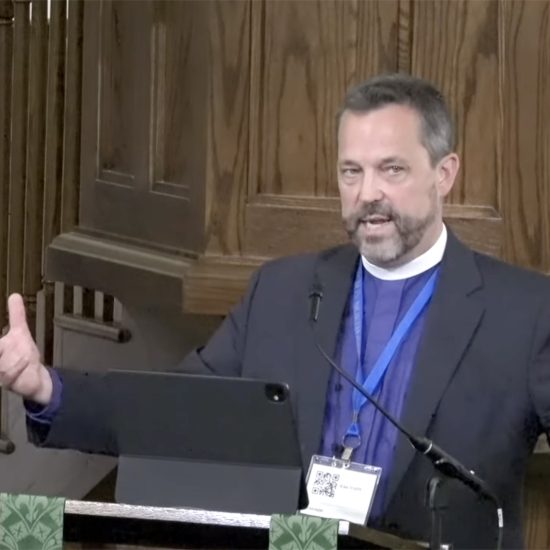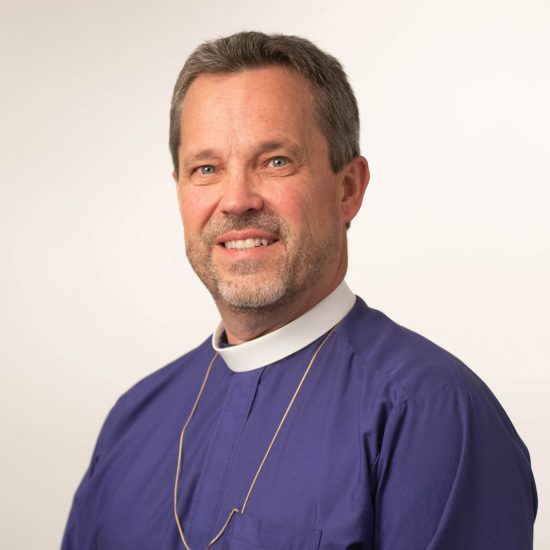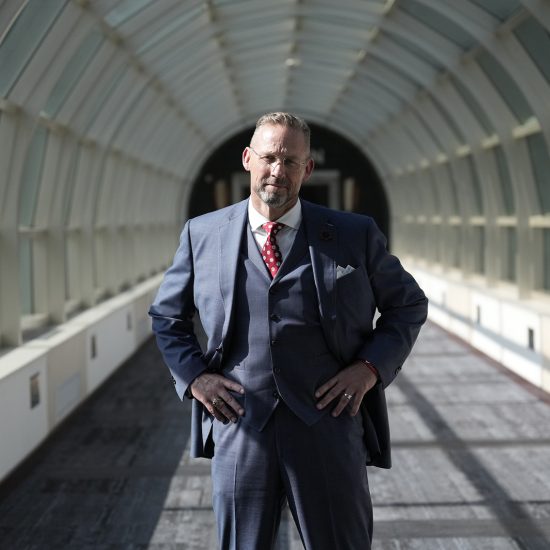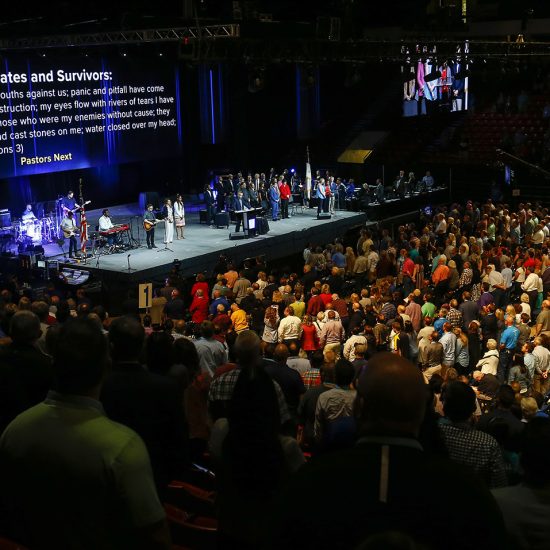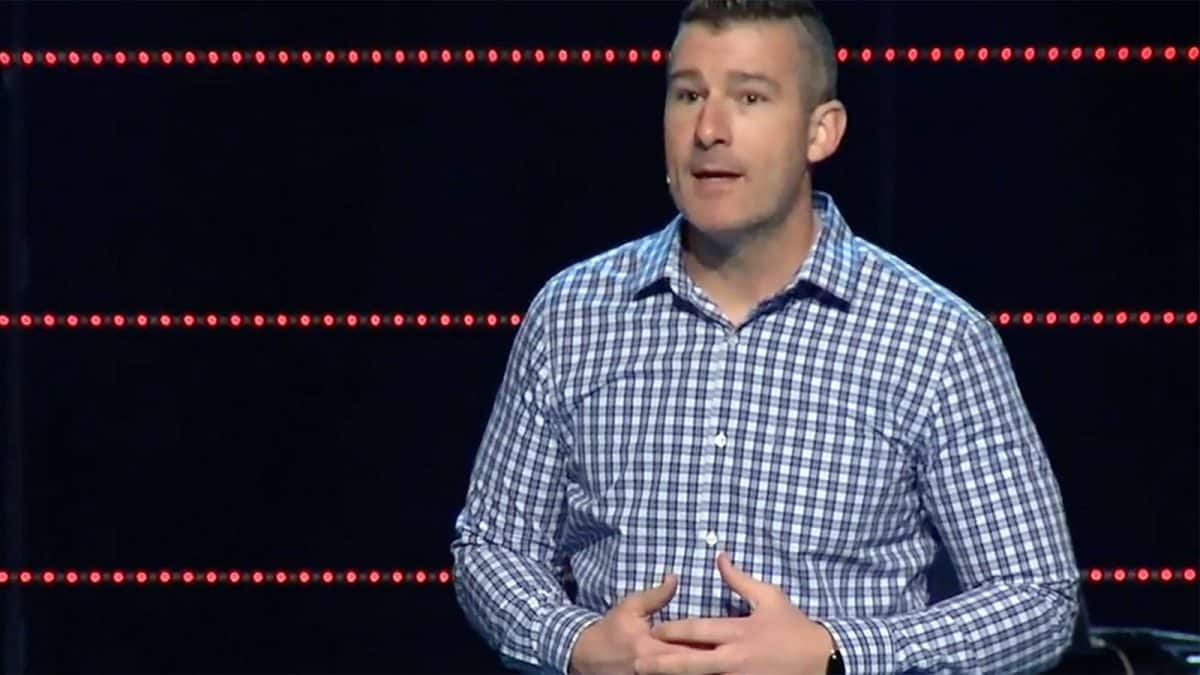
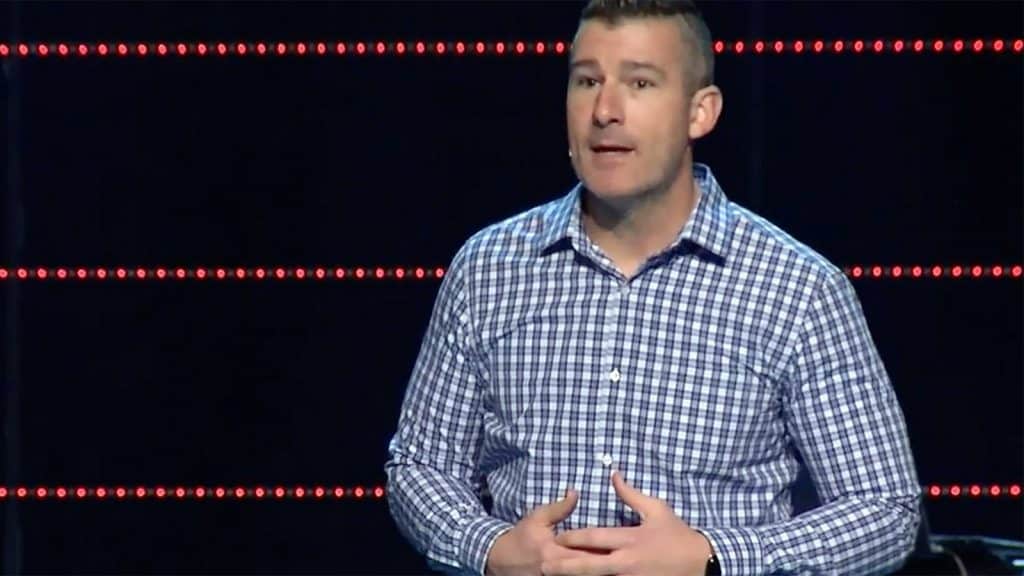
Pastor Andy Savage addresses Highpoint Church during a Sunday service in Memphis, Tenn. Photo courtesy of Highpoint Church via YouTube
(RNS) — “Devastating news today,” Jules Woodson tweeted over the weekend.
“My abuser is back in the pulpit.”
Woodson was responding to news that Andy Savage, her former youth pastor, reportedly is planning to start a new church.
Last year, Woodson drew attention to the problem of abuse in evangelical churches when she spoke out about being sexually abused by Savage when she was a member of the Texas youth group he led two decades ago.
She was 17 at the time. He was a college student in his 20s. Under Texas law, sexual contact between clergy and someone for whom they are a “spiritual adviser” can be considered sexual assault.
Savage, who went on to become teaching pastor at a Memphis, Tennessee, megachurch, eventually confessed to “a sexual incident.” His confession was met with applause from the congregation at Highpoint Church.
He later resigned after a leave of absence and investigation.
Now Savage reportedly is planning to start a new church in Memphis.
And Woodson is worried about the message that sends to those who have experienced abuse — and those who would abuse.
“This has never been just about me. This is about all survivors,” she told Religion News Service.
“And it sets a dangerous precedent when you have someone who has admittedly committed a crime — broken moral, ethical, lawful qualifications — and here they are, 18 months (after resigning from Highpoint) later, starting a church.”
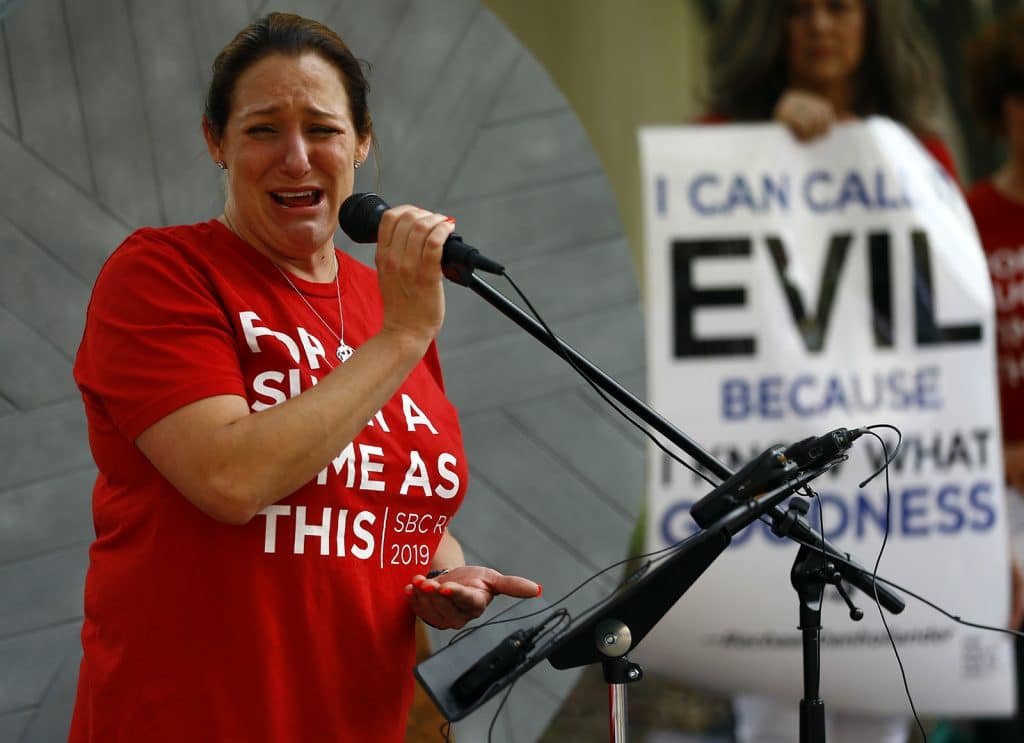
Jules Woodson of Colorado Springs becomes emotional as she talks about her abuse survival during a rally outside the annual meeting of the Southern Baptist Convention at the BJCC, June 11, 2019 in Birmingham, Ala. RNS photo by Butch Dill.
Watch Keep, a blog advocating for abuse survivors in the church, posted audio Saturday (Oct. 26) of Savage reportedly speaking at an interest meeting for a new congregation in Memphis called Grace Valley Church.
The website gracevalleymemphis.org links to a Google form that asks those who visit the site for their names, contact information and information about spouses or children. It also offers opportunities to volunteer or submit prayer requests.
That form includes a note saying it was “created within andysavage.com,” which is the former pastor’s personal website.
Savage could not be reached for comment.
On the audio, a voice reportedly belonging to Savage says if that if he ever were to return to ministry, he wouldn’t do what he did before: ignore people’s struggles. He then delivers a message about how God’s “grace flows down” into valleys and Christians ought not judge others.
“I got my hands on the wrong things in my life for all the right reasons – looking for hope, looking for fulfillment, looking for a way to make my life better, trying to stay out of the valley,” he said.
“That’s what we do. It’s just the human condition, which is why we don’t have to judge others.”
Woodson identified the voice as Savage’s, according to the Commercial Appeal. The Memphis newspaper also reported the former pastor “had filed nonprofit information for Grace Valley Church with the state earlier this month.”
That news prompted heated discussion on social media.
Some on Twitter contrasted reports of Savage’s possible return to the pulpit with a viral video of a prominent evangelical pastor criticizing popular Southern Baptist Bible teacher Beth Moore and other women speakers, claiming the Bible bars them from the pulpit.
“Pastors, where are you?” tweeted Rachael Denhollander, a leading advocate for abuse survivors in the Southern Baptist Church.
“You who preach the requirements for pastors, where are you now? You who teach that if only women would submit and men lead, abuse would be solved, where are you? You who laughed at a female teacher being told ‘go home’, where are you? Where are you now?”
Moore herself, who has spoken about her own childhood sexual abuse, responded to Woodson’s tweet with sympathy.
“Jules, I can’t imagine how devastating that must be. I am so sorry,” she said.

Southern Baptist Convention president J.D. Greear speaks along with Rachael Denhollander and Beth Moore during panel on sexual abuse in the Southern Baptist Convention takes place at the Birmingham-Jefferson Convention Complex in Birmingham, Ala. on June 10, 2019.
RNS photo by Adelle M. Banks.
Others on Twitter urged Woodson to forgive Savage.
Boz Tchividjian tweeted that is a pattern abusive church leaders often follow. Tchividjian is executive director of GRACE (Godly Response to Abuse in the Christian Environment).
“A common tactic of church leaders who have used their power and authority to sexually victimize is to place themselves back into positions of leadership while piously gaslighting and guilting those who object by accusing them of being unforgiving, unmerciful, & un-Christian,” he said in a brief thread on social media.
“Such dark tactics must be exposed over and over again until they are seen for what they are…the protecting and empowering of offenders and the attempted silencing of truth.”
Wade Mullen, an advocate and researcher who has studied abusive situations in evangelical settings, said Savage’s statements “absolutely” raise red flags for him.
In the past, Savage has minimized the abuse by referring to it instead as an “incident,” Mullen told RNS. The former pastor also has emphasized it happened two decades ago, creating distance between the abuse and what he is doing now, Mullen said.
In the most recent audio recording, Mullen said, Savage never names what he did and continues to downplay its gravity, simply suggesting people Google him.
“In my opinion, he’s still engaging in deception. Until he’s willing to speak the truth, until he’s willing to name what it is accurately, then he shouldn’t be trusted. The deception will continue,” Mullen said.
Woodson already has forgiven Savage, she said.
“I will openly say that I forgave Andy a long time ago before I ever went public, and I had to do that just so I could move on with my own life without an apology. But that’s very personal, as is his forgiveness between him and the Lord,” she told RNS.
There’s a difference between forgiving someone and giving them a pulpit, Woodson added. Forgiveness doesn’t negate justice, accountability and consequences.
Woodson hopes Savage has repented. She has no problem with him sitting in the church pews, she said.
But she believes he “biblically is disqualified” from a position of leadership in the church, she said. She pointed to 1 Timothy 3, which says church leaders must be “above reproach.”
She also is worried that his return to ministry would send a troubling message that the church is a safe place for abusers.
That’s why, she said, she feels called to “shout it from the rooftops that this is not OK.”
The news of Savage’s possible return to the pulpit was re-traumatizing, Woodson said. Now that the initial shock has passed, she feels a “new spark” to continue to speak out for abuse victims in the church.
“As Christians, we are called to speak to certain injustices, and having a wolf back in the pulpit over vulnerable people is certainly an injustice that I am willing to stand on the platform and speak against,” she said.

